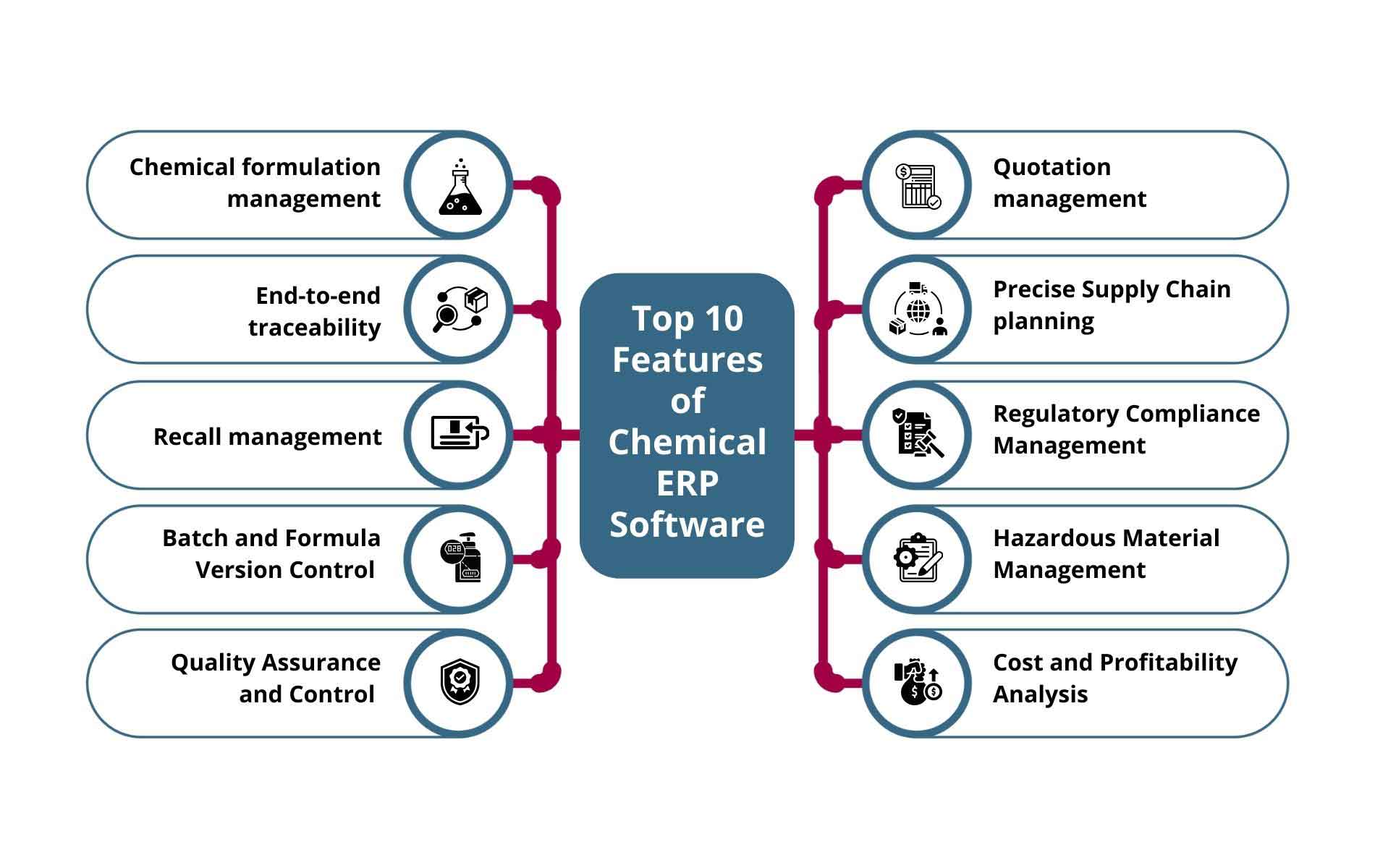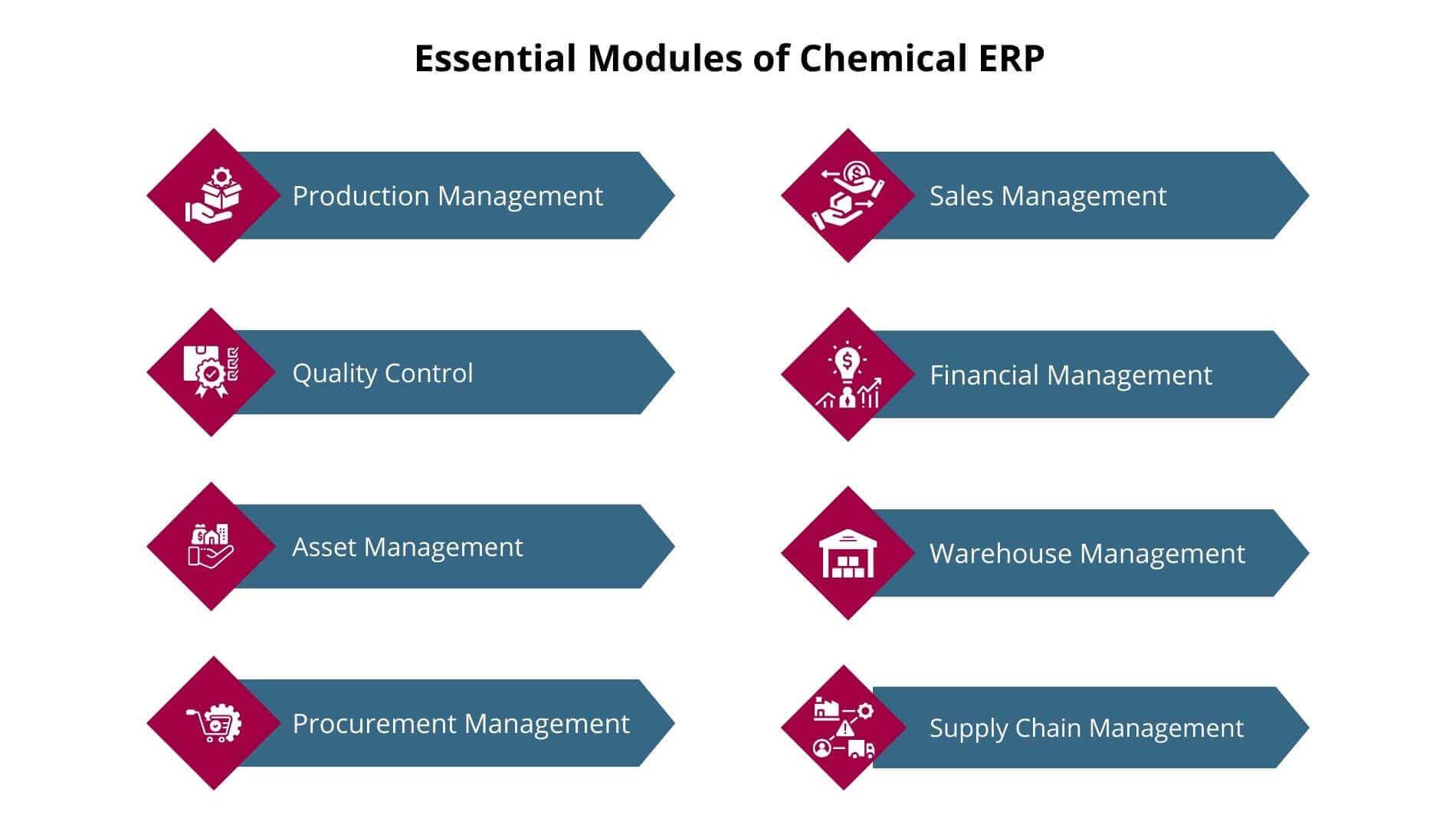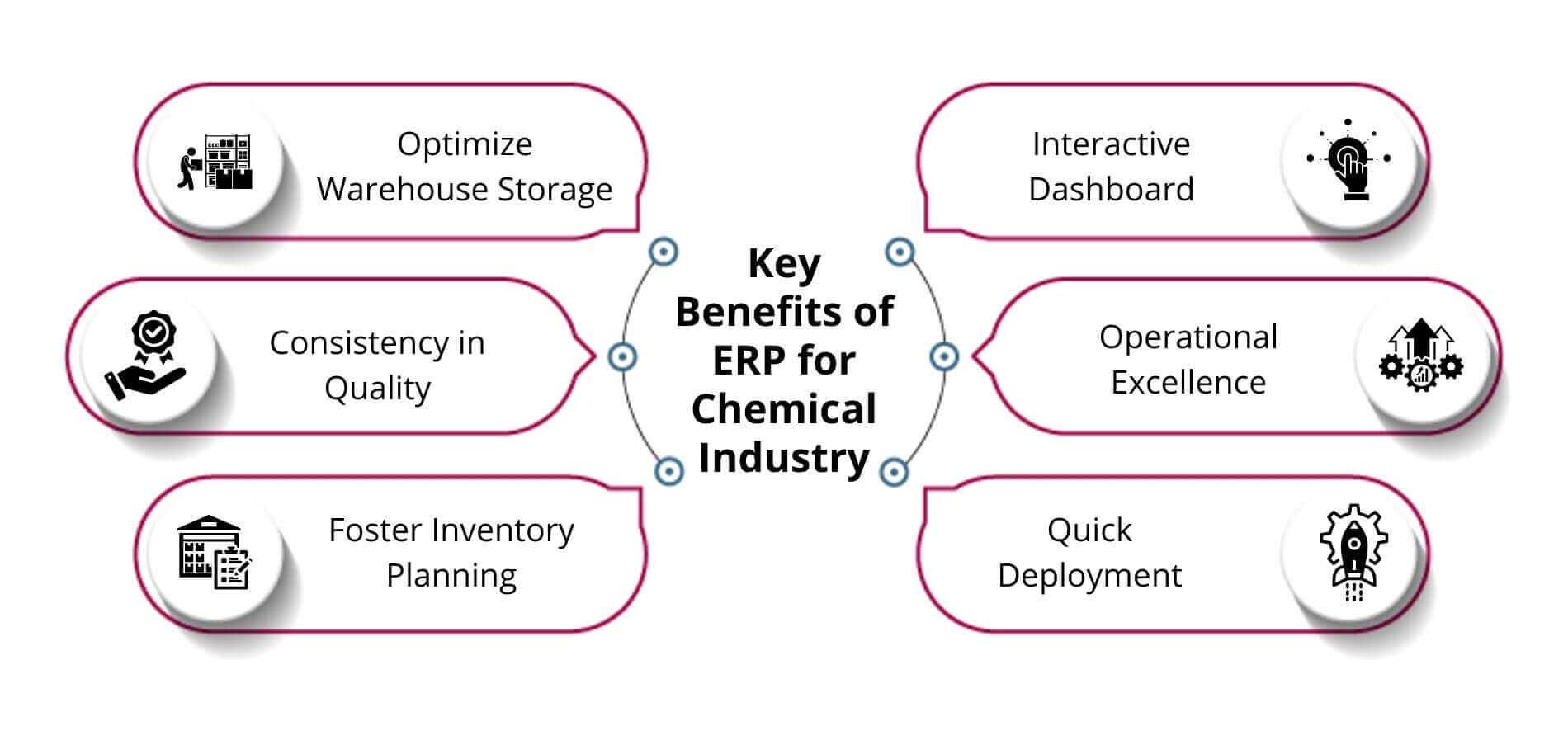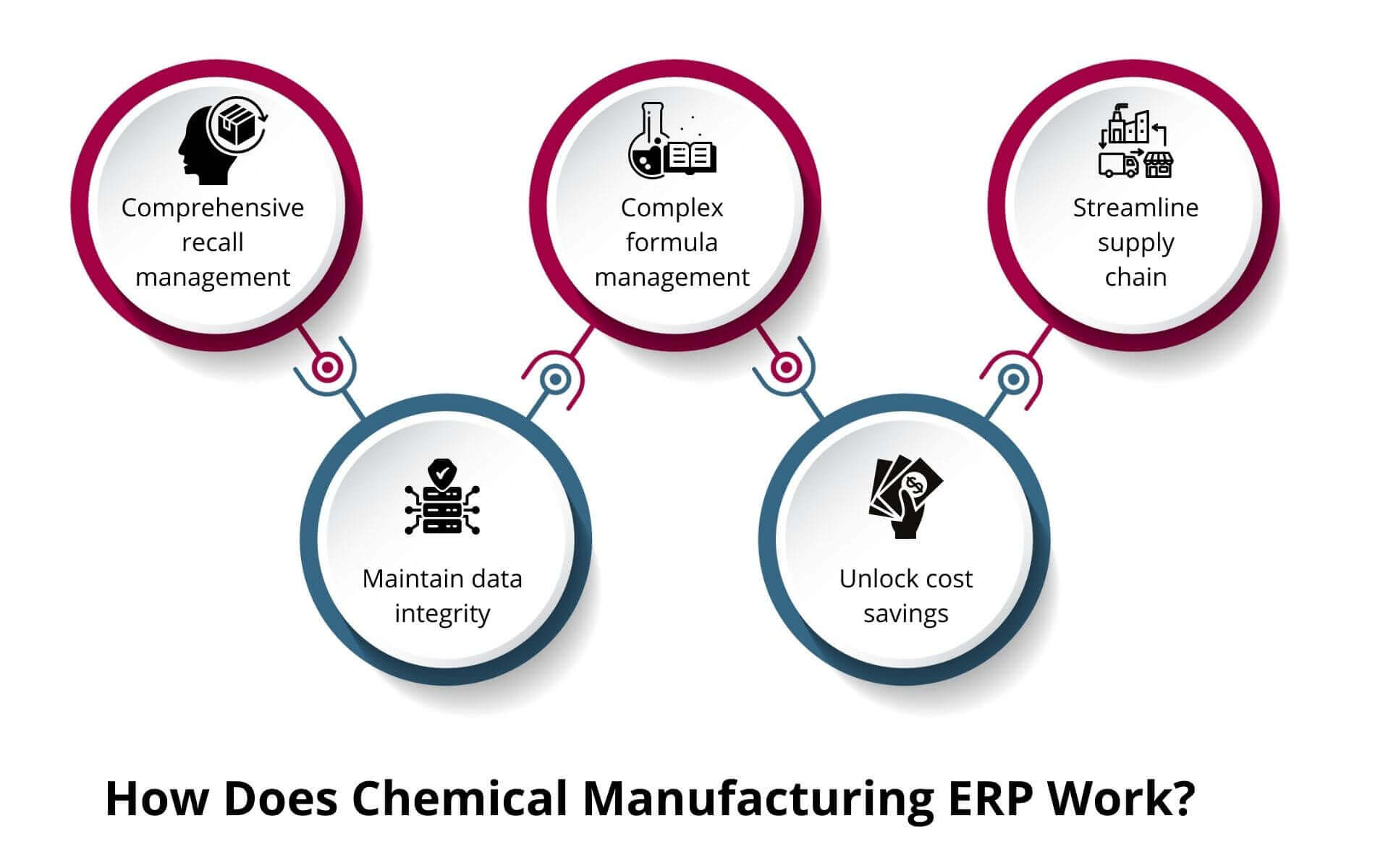ERP for Chemical Manufacturing Explained:
What is ERP for Chemical Manufacturing Industry?
ERP for Chemical Manufacturing industry is a fully integrated and comprehensive software that facilitates a combination of modules to automate various aspects of the chemical industry such as production planning, sales forecasting, reporting & analysis, and predictive analysis, and meet the unique needs of the chemical manufacturing companies.
Sage X3 is a ready-fit solution that equips modern-day chemical businesses with the cutting-edge technology & end-to-end visibility required to grow and excel in today’s highly competitive & complex business landscape. It is a multi-functional ERP Software that comes with powerful formula management tools, business intelligence tools, real-time inventory & warehouse management, compliance capability, and integrated project management functionality, among others.
Overview of India's Chemical Industry
According to a report by the International Trade Administration Department of the Government of the USA, the Indian chemical manufacturing industry is the sixth largest in the world. As of 2024, it was valued at $220 billion and is expected to reach $300 billion by 2026.
The growth in the Indian chemical industry is attributed to various factors such as the steady increase in India’s disposable income, increased focus on exports to Asian & Southeast Asian nations, and numerous Production-linked Incentives (PLIs) released by the government.
Top 10 ERP for Chemical Manufacturing
Now, let us discuss the top 10 chemical manufacturing ERP software.
1. Sage X3
Sage X3 is an industry-focused multi-functional ERP that empowers your chemical business with robust quality control, lot tracking, and regulatory compliance capabilities to adapt to your changing business needs. This Best ERP Software in India takes care of complex domestic & international regulations pertaining to hazardous chemicals while you focus on growth & expansion. Its faster & timely order fulfillment process enhances customer experience and reduces lead time.
Features
- Anticipate your customer needs & stay ahead of competitors using powerful demand forecasting tools
- Best-in-class production management & chemical formula management tools
- Companywide access to near-real-time data & visual representation through intuitive charts, reports & customized dashboards
- Maintain integrated supply chain network & improve efficiency in logistical & distribution network
- Integrated AP Automation, AR Automation, and financial management tools for timely detection & prevention of fraudulent activities and maintaining audit trails
Drawbacks
- Requires upfront investment. (You can overcome this higher cost barrier by subscribing to a cost-efficient Cloud ERP)
- The implementation may take longer time depending on the size & complexity of your business
2. Oracle NetSuite
Oracle NetSuite is a fast, smart & adaptive system that provides solid integration with your legacy CRM, e-commerce, and inventory management software. It facilitates a single unified platform to the chemical chemical manufacturers a single unified platform to manage & streamline their day-to-day operations.Features
- Integrated Inventory Management, Quality Control, HR, and Process Automation capabilities
- Supports complex revenue management & omnichannel sales management
- Wider customization & integration capabilities with third-party add-ons
- Resource optimization, shop floor management, work order management, and order & billing functionality
- Limit access to sensitive business data through role-based permissions and end-to-end encryption
Disadvantages
- Requires a deep learning curve
- Longer implementation time
3. Acumatica
Acumatica is an increasingly popular tool that provides a holistic view of your business operations from billing, accounting, project management, and payroll, to sales. It is flexible & customizable to meet the needs of mid-sized organizations.
Features
- On-premise, Cloud & Hybrid deployment options
- Simple, easy to navigate and intuitive user interface
- Comprehensive data analysis, data management & reporting ability
- Solid integration with legacy tools using powerful APIs
- Unlimited user experience that doesn’t consider the number of users while determining product pricing
Drawbacks
- Complex pricing structure
- Only available through the official partner channel
4. SAP
SAP is a well-known ERP covering different business aspects, from production, sales, supply chain, and human resources to regulatory compliance. It offers deep customization benefits at the infrastructure levels alongside access to cutting-edge technology.
Benefits
- Access to modern technologies such as Machine Learning (ML) and Artificial Intelligence (AI)
- Supports cross-modular workflow management, automation & real-time collaboration
- Abundant of how-to tutorials and video materials to help you get started
- Amazingly integrates with different business aspects
- Regular updates, upgrades & patches to improve user experience & fix technical glitches
Drawbacks
- Higher implementation cost
- Need for specialized expertise for additional customizations
5. Infor
Infor is an industry-specific solution that provides extensive integration & customization capabilities and access to the cloud technology. If you’re looking to host your critical business data on Amazon Web Services (AWS) or Infor’s native Infor OS, you’re good to go with Infor.
Features
- User-friendly and intuitive interface
- Integrated shipment & order tracking, warehouse management, and product life cycle management capabilities
- Offers a cloud-based version (traditionally it was available only as an on-premise solution)
- Ease of personalization & customization
- Improve operational processes and enhance business agility
Drawbacks
- Expensive compared to rivals
- Best suited for small and medium-sized businesses
6. Certinia
Certinia (formerly, Financial Force) is a complete suite to take care of your company’s inventory, accounting, purchase order, contract, and expense management needs. It is flexible to meet your evolving business requirements as your business grows in size & complexity.
Features
- A simple and intuitive user interface to easily get started without much hassle
- Availability of time-based & usage-based subscription pricing
- Deeper insights into different aspects of your organization
- Suitable for businesses of all sizes – whether small, medium or large
- A single platform to manage all core financial operations
Drawbacks
- Difficult to migrate from the on-premise to the cloud edition
- Longer implementation time
7. Epicor Kinetic
Epicor Kinetic is an ERP tool tailored for retailers, distributors, construction, and automotive companies. It is available as an on-premise, cloud, and hybrid solution that addresses a myriad of business challenges.
Features
- Availability of Android and iOS apps for remote expense tracking & drilling down other business data
- Centralized reporting system with multi-company & multi-currency capabilities
- Real-time collaboration feature
- Offers extensive documentation to make the best of the product’s features
- Production planning & scheduling, human resources, sales management, and supply chain features
Drawbacks
- Some features available in rival products are missing
- Higher deployment cost
8. Microsoft Dynamics 365
Microsoft Dynamics 365 is an integrated suite that brings digital transformations within your company. In today’s era of growing competition & rapid changes in market trends & consumer preferences, it provides a unified platform for businesses to manage income leads, sales operations, and customer support queries.
Features
- Get up-to-the-minute insights to capture new opportunities & stay ahead of competitors
- Builds a comprehensive database of customer information, their past purchases, and support interactions for faster resolution of issues
- Turn one-time customers into repeat & loyal customers by focusing on the right channel of communication
- Analyze sales performance using various metrics and identify room for improvement
- Use data intelligence for proactive risk management
Drawbacks
- Higher cost (Includes implementation, licensing, training, and support costs)
- Requires extensive employee training
9. Aquilon
Aquilon is a complete business planning & management solution specifically tailored for small and medium-sized businesses that are looking to benefit from comprehensive accounting, efficient supply chain, and manufacturing activity. It can be deployed either on-premise, cloud, or hybrid, depending on your business needs.
Features
- Supports extensive customizations to meet your unique business needs
- Allows your employees to focus on more productive operations by eliminating data entry
- Offers numerous modules to take care of everything from inventory management, supply chain, and customer support to financial planning
- Reduce data duplication & manual work, and benefit from process automation & consistency
- Supports multiple levels of BOMs, and batch & process manufacturing
Drawbacks
- Limited reporting functionality
- It is a bit overwhelming interface requiring a deep learning curve
10. Deacom
Deacom ERP is a feature-rich ERP that provides a standard and consistent experience throughout different modules with transparent pricing. If you’re a manufacturer, you’ll benefit from its batch processing, lot traceability, inventory planning, and e-commerce distribution toolset.
Features
- An all-in-one solution to meet your growing business needs
- Robust production management capabilities to meet your evolving business needs
- Warehouse Management, Customer Relationship Management, Bill of Materials Management, and Quality Control
- Web-based interface for easy remote integration
- In-house support team; no outsourcing
Drawbacks
- Additional support & training costs
- Mostly tailored for medium & large-scale enterprises
What are the Challenges Faced by India's Chemical Industry?
Though India is a significant producer of chemicals, the domestic chemical industry faces certain challenges. They are as follows:
1. Scarcity of Raw Materials
Many chemical companies across India rely on imported raw materials which makes them vulnerable to supply chain disruptions, and global price fluctuations. Other issues such as geopolitical conflicts add up to this.
2. Operational Risks
Chemical manufacturing companies face significant operational risks of fatal accidents, fires, and hazards that can result in threats to the safety of workers and disrupt business operations.
3. Lack of Skilled Labors
The industry faces a huge shortage of skilled laborers that apparently affects the productivity of the business. However, the company has to undergo compromised product quality, reduced productivity, limited growth, and more.
4. Under-utilization of Resources
Owing to the oversupply of materials, the cost of petrochemicals has gone too down globally. Hence, the domestic business owners have been underutilizing their plants which is affecting the growth of the sector.
5. Technological Advancements
With the advancement of new technology, businesses benefit from reduced cost, lower waste, and higher efficiency. However, adopting technological innovations requires significant investment in research, implementation, talent acquisition, employee training, and other aspects.
Top 10 Features of Chemical ERP Software
Now that we’ve discussed the complex challenges in the chemical industry, let’s deep dive into how Business Management Software will help you convert them into opportunities
1. Easy Chemical Formulation Management
It requires a significant span of time for a company to perform research and development formulation. Through the Chemical ERP Software our business can store all the relevant activities that are performed in your laboratory.
These activities might include various formulations as well as different restrictions of chemicals is intern produced. It is one of the best solutions that can also offer you the most expected cost of your recently built formulation which will be indeed based on the present cost of raw materials. You can track all new formulas as well as the manufacturing process of chemicals. Generate reports with the latest technology.
2. Quotation Management
Today’s competitive world needs innovative ERP CRM for chemical process manufacturing Industries through which they can manage all the samples and can provide regular quotations that will be based on the respective samples.
However, these samples are completely based on the fluctuations designed specifically for the raw material off the market.
With the help of ERP Implementation for chemical industry, we can generate databases of different samples and send them to the client along with the courier details.
3. End-to-end Traceability
The ERP for chemical helps you improve the major operations of chemical manufacturing.
ERP for the chemical industry integrates all business activities into a unified platform. Its record-keeping procedures bring end-to-end traceability into the system. Your business gains from increased visibility into all of its operations, and it can effectively face real-world challenges that are unique to your industry.
ERP Chemical Software automates and simplifies the complex tasks of maintaining safety standards, performing quality checks, and avoiding regulatory hurdles. Generating the Bill of Materials (BOM), calculating Yield Loss & Handling Loss, and raw material procurement becomes easier. It provides a glimpse into the day-to-day activities. and provides a 360-degree view of your business operations in customized dashboards and reports.
4. Precise Supply Chain Planning
The software involves various modules of supply chain execution and planning. The features look after the concerns of chemical manufacturing processes like steep transportation, inventory costs, rising costs, increased waste, and more.
The feature also helps companies to enhance cycle time with the supply chain visibility while also delivering a quick order-to-cash cycle with more accurate planning. It lets you check the total view of purchases, and check vendor performance. The supply chain feature also obtains a clear view of all evaluations, and purchases while also managing strategic reduces
5. Recall Management
Sage X3 software enables agility and helps detect the source of the problem in the case of a product recall. The software helps keep an up-to-date record of every piece of information from the operating processes. This helps chemical manufacturers stay updated with the information and aids in preparing for any major product recalls.
Moreover, the recall management feature helps chemical companies manage product sustainability, recalls, expiry management, labelling, and more critical issues for the manufacturing business.
6. Regulatory Compliance Management
Chemical ERP systems help businesses comply with stringent regulations like OSHA, REACH, and EPA. They automate documentation, reporting, and tracking to ensure compliance across operations.
With tools for Material Safety Data Sheets (MSDS) and labeling, these systems safeguard businesses from non-compliance risks while maintaining global safety standards.
7. Batch and Formula Version Control
This feature allows manufacturers to manage formula versions efficiently. It provides traceability for changes, enabling adjustments without losing historical records.
The system ensures consistency across production cycles, reducing waste and improving product quality.
8. Hazardous Material Management
ERP solutions include advanced tools for tracking and managing hazardous materials. They ensure compliance with safety standards and provide detailed records for audits.
Features like incident tracking and material classification reduce workplace risks and ensure secure handling and storage.
9. Quality Assurance and Control
With automated quality checks at multiple stages, ERP systems ensure product integrity. These tools detect issues early, minimizing defects.
The software generates detailed reports, providing insights for continuous improvement and ensuring customers receive reliable products.
10. Cost and Profitability Analysis
Chemical ERP solutions offer tools to track and analyze costs, helping businesses maintain profitability. They provide insights into pricing strategies by accounting for material, labor, and overhead costs.
This feature helps optimize expenses and ensures competitive pricing in the market.
Essential Modules of ERP Software for Chemical Industry
Chemical companies deal with complex chemical formulas and have to adhere to stringent quality, safety & compliance standards. Thus, it’s important to select the right ERP containing essential ERP modules.
1. Production Management
The Production Management module is an important module of the ERP. It handles everything from planning & scheduling production activities, managing Bill of Materials (BOM), and cost control, to comprehensive quality control.
- Robust Formula/ Recipe management capabilities
- Minimize factory overhead & ensure continuity in the production activity
- Minimize unplanned machine breakdowns
- Material management & shop floor management
- Integrated quality control at every level to reduce refund costs & negative customer perception
2. Sales Management
The Sales Management System enables decision-makers to make strongly data-backed decisions with confidence and ensure the sales & marketing activities align with your strategic goals & objectives.
- Analyze actual sales with targets
- Simplified campaign management and execution
- Lower order fulfillment time & enhance customer satisfaction
- Identify cross-sales opportunities
- Up-to-the-minute sales reports with intuitive charts, reports & customized reports
3. Quality Control
The Quality Control management provides specialized tools for inbound and outbound quality assurance. It lays down clear standards and has continuous monitoring and feedback mechanisms in place to ensure adherence to the Acceptable Quality Limit, ensure maximum customer satisfaction, and build a positive brand image.
- Inspect raw materials for quality compliance and manage supplier performance
- Perform a series of checklists to ensure higher manufacturing standards
- Easily identify the source of defects and facilitate market recalls, if required
- Stringent quality control mechanisms at every level to reduce waste, and minimize costs
- Generation of automated quality compliance reports
4. Financial Management
Financial management is the backbone of every organization’s success. Financial Management software plays a vital role in building greater financial transparency, minimizing costs, and optimizing organizational resources for achieving the company’s strategic objectives.
- Comprehensive financial toolkits and reporting functionalities
- Thorough financial planning, reporting, and budgeting activities.
- Accurately forecast your financial health and set realistic budgets
- Automated accounts payable & receivable management, and regulatory adherence
- Automated generation of financial statements (Balance Sheet and Income Statement)
5. Asset Management
The Asset Management module lets you track your assets throughout their lifecycle from acquisition to disposal, and ensure end-to-end regulatory adherence while you focus on profit maximization. By managing your assets efficiently, chemical manufacturers can reduce disruptions, minimize risks, and improve operational efficiency.
- Create asset profiles, tag & categorize assets
- Track and manage tangible assets (land, building, furniture, and machinery)
- Track and manage intangible assets (goodwill, patents, copyrights, and intellectual property rights)
- Automate the calculation of depreciation & streamline regulatory compliance
- Identify Non-performing Assets (NPAs) and take measures to improve asset utilization
6. Warehouse Management
The Warehouse Management System provides deeper insights into your warehouse operations and allows you to take strategic measures to minimize storage costs, reduce operational delays, and optimize your order fulfillment capabilities.
- Assign unique barcodes, RFID tags, and lot number to warehouse items
- Distribute warehouse items using the FIFO method or LIFO method
- Increase your inventory turnover
- Enhance market responsiveness
- Reduce human errors in order picking, packaging & shipment
7. Procurement Management
The Online Procurement Management System streamlines procurement-specific processes such as purchase requisition, order generation & approval, and spend management. It builds a comprehensive vendor database and regularly evaluates vendor performance.
- Streamline Purchase Order (PO) generation, Purchase Requisition & approvals
- Up-to-the-minute spend analytics using intuitive charts & reports
- Minimize human errors & manual labor work in the procurement process
- Reduce the risk of missing deadlines
- Cut down costs and improve regulatory compliance
8. Supply Chain Management
The Supply Chain Management in ERP facilitates carefully devised tools to give you complete control over your supply chain activity and keep demand & supply aligned. It helps you avoid gaps and discrepancies in the supply chain.
- Evaluate & mitigate risks in the supply chain activity through proactive risk management
- Improved product tracking, enhanced quality control, and digitized shop floor management
- Integration with legacy tools for seamless data sharing & instant synchronization
- Improve transparency & collaboration in logistics, delivery & returns
- Gain agility and competitive advantage in the supply chain
Key Benefits of ERP for Chemical Industry
An ERP provides better control over the company’s operations and empowers it with quality control, innovation, supply chain resiliency, and various other ways. Let’s deep dive into the benefits of ERP:
1. Optimize Warehouse Storage
In today’s times, warehouse costs are ever-increasing due to supply chain modernization and e-commerce booms. As the warehouse costs directly affect the company’s profitability, businesses need to proactively confront this challenge.
Bring efficiency into your warehouse operations, and transform manual workflow with automation. Make the best of modern technology and innovation to save warehouse storage, adopt best warehousing practices, fix mismanagement, and reduce costs.
2. Consistency in Quality
In today’s highly-competitive business landscape, businesses have to consistently focus on quality to meet stringent regulatory requirements, and heightened customer expectations.
Adopt the best quality control practices, and maintain consistency in the quality across the production-line. Automate quality inspections, and generation of non-conformance reports, to comply with the best industry standards.
3. Foster Inventory Planning
With ERP, you don’t need to purchase a third-party tool to plan and manage your inventory. It automates everything from order quantity calculations, stock replenishments, and real-time stock notifications to inventory reporting.
With the help of this Sage 300 ERP for chemical industry, you can choose the right inventory depending on certifications, expiry dates, as well as status while making manufacturing and distribution simpler. With a robust Inventory Management System, you can easily optimize the inventory levels with procurement and automated planning schedules for better supply chain management.
4. Interactive Dashboard
Much like how Pharma ERP Software streamlines pharmaceutical operations, the ERP for chemical manufacturing optimizes the core chemical manufacturing, distribution, human resource, and other activities.
ERP Chemical Software offers a single intuitive platform or dashboard with which you get to extract, view and assess crucial business data with a few clicks, thus offering you improved business insights. Also, you can browse through critical customer data, suppliers/vendor records and all other vital data from a unified and easy-to-use dashboard with Sage X3.
5. Operational Excellence
For a business in the chemical industry, keeping control over costs whilst meeting production needs is the key to operational excellence and Sage X3 ERP software for chemical industry helps you achieve that in a streamlined and efficient way. Operational efficiency is of utmost importance when it comes to addressing all aspects of a business to help curb costs, improve relationships with customers, etc.
Also, optimizing various operations across your entire organisation is extremely easy with Sage X3 ERP, as it offers a unified and single platform bridging together all your critical operations. Being affordable and budget-friendly, Sage X3 ERP for chemical industry is perfect for small and mid-sized businesses operating in this sector.
6. Quick Deployment
Designed to suit the specific requisites of the chemical industry, the implementation is hassle-free and quick irrespective of the size of the business. Further, all the modules of Sage X3 for chemical industry are finely integrated to allow a seamless flow of data and streamline manufacturing, production and shipping processes.
It ensures full compliance with statutory and regulatory requirements. What’s more, it also addresses excise and outsourcing processes in a seamless manner.
Limitations of Chemical Manufacturing ERP Software
While an ERP is a significant investment to foster growth and a data-driven culture, it has certain limitations.
1. Upfront Cost
Traditional On-premise ERP tools are often expensive compared to cloud and Hybrid ERP. Their upfront investments may include various expenditures such as software licensing fees, hardware upgrade costs, and support & training costs, among others.
2. Implementation Delays
At times, you may run into data conversion issues which can delay the implementation process and disrupt your initial pre-planning.
3. Legacy Integration
Some ERPs may not support integration with legacy applications. This is why, it’s important to select the right ERP.
4. On-going Training
You will need to train your employees to get familiar with the new system. This can take some time.
Future Trends of AI in Chemical Manufacturing
AI is transforming the chemical manufacturing industry to save costs, enhance decision-making abilities, and increase productivity.
1. Collaborative Robots (Cobots)
Collaborative Robots (Cobots) help their human counterparts in manufacturing-specific tasks such as heavy material handling, and packaging. Most of the time, these cobots work independently without requiring human intervention.
2. Industry 4.0
Industry 4.0 (also called, the Fourth Industrial Revolution) uses advanced computing systems that are capable of observing, hearing, comprehending, and learning from human actions, and working alongside humans to minimize the amount of time required to perform manufacturing-specific tasks.
3. Advanced Robotics
Advanced Robotics can perform operations independently after taking commands from their human counterparts. For example, they can transport materials within the warehouse. Upon facing an obstacle, they can determine the optimal route for themselves.
4. Predictive Maintenance
Predictive Maintenance uses IoT-based sensors to gather & record machine logs in real-time (such as machine temperature). Maintenance Software enables anticipating machine failures, reducing downtimes, and increasing asset lifespan.
Who Needs an ERP for Chemical Manufacturing?
An ERP is a must-have investment for industries of all sizes and types. Here’s how it benefits small, medium and large enterprises:
1. Small Enterprises
Manage your resources – whether cash, fixed assets, or human workforce – effectively to achieve your strategic goals & targets. Achieve inter-departmental collaboration, track performance metrics, and operate with the same efficiency as your rivals for sustained growth and profitability.
2. Medium-sized Enterprises
ERPs are a blessing for medium-sized enterprises that need access to an abundance of tools to support key business operations. Automate your workflow, fix inventory-specific challenges, track customer orders, gain consistency in the production output, and improve efficiency in marketing activities with a comprehensive business solution.
3. Large Enterprises
Every business is unique. It needs a tailored solution that can be fine-tuned for its specific needs. Manage the complexities of your global operations, measure performance with KPIs, and enhance the Cash Flow Statement. Let’s take an example of an Automotive ERP that provides powerful predictive analytics & forecasting tools to boost sales, identify changing market requirements, and make smarter decisions to gain an advantage over your competitors.
When is the Best Time to Invest in an ERP for Chemical Manufacturing?
Here are some potential scenarios that may warrant the need to deploy an ERP throughout your chemical business:
1. Lack of Collaboration
Build a roadmap for your company’s future growth & success and support further expansion through the cohesive planning and real-time collaboration features of ERP Application.
2. Increasing Business Complexities
It’s worth making an investment in an ERP if you’re witnessing an increase in the scope of your business activities. Your ERP will support streamlining key operations, and managing huge data loads, eventually increasing efficiency.
3. Evolving Regulatory Requirements
The chemical industry in India is subject to strict regulatory adherence. India’s tax regulations, environmental compliance standards, and regulatory requirements keep changing occasionally, requiring an efficient system.
4. Reduced Returns on Investments
Perform a comprehensive analysis of your investments and discover new cost-cutting measures. Prioritize the projects that provide the higher return on your investments, and align your resources accordingly.
5. Technological Obsolescence
Outdated business techniques such as overreliance on dozens of spreadsheets and multiple legacy tools lead to a loss of efficiency and delays in decision-making. Invest in an ERP tool to benefit from cutting-edge technology and gain long-term sustainability.
How Does an ERP for Chemical Manufacturing Work?
Curious how would an ERP deliver transformative changes and unlock future growth opportunities? Here’s how it works:
1. Maintain Data Integrity
Businesses often suffer from data silos, data quality, reliability & integrity issues. The data is often scattered across different spreadsheets, or it is incomplete or unstructured. Locate your data easily, restructure it in an orderly manner, and gain a competitive edge through ERP’s powerful data consolidation capabilities.
2. Comprehensive Recall Management
ERP supports comprehensive recall management in the event of a threat to public health or violation of the country’s laws. Maintain end-to-end traceability throughout the chemical manufacturing process, perform batch tracking and timely quality audits to protect public health and your brand’s reputation.
3. Complex Formula Management
Redefine your chemical manufacturing process, gain efficiency in your operations, and make rapid transformative changes with access to exceptional tools and strong formula management features.
4. Unlock Cost Savings
Many people perceive ERP as an expensive investment due to higher ERP cost. However, it offers substantial cost-saving benefits and increased profit opportunities in the long term. By streamlining business processes, eliminating operational inefficiencies, minimizing data redundancy, and enabling faster collections of payments, you will benefit from better financial stability in the long run.
5. Streamline Supply Chain
Increase the efficiency of your logistical and transportation operations, and make significant savings on the transportation of goods. Build contingency plans, and gain end-to-end visibility into the movement of goods as they move throughout the supply chain operations.
Unleash Efficiency & Maximize Productivity with Sage X3
ERP for Chemical Manufacturing is a comprehensive software that takes care of complex formula management, production planning, inventory forecasting, and quality & regulatory adherence. It helps you build a resilient supply chain network, and ensure faster fulfillment of customer orders.
With Sage X3, stay focused on your long-term business goals by aligning your resources & strategies with your wider organizational objectives. Harness the power of Business Intelligence to gain complete visibility into critical business operations, make timely & accurate forecasts, lower factory overhead, and stay ahead of your competitors. Say goodbye to the chaos of managing dozens of spreadsheets and legacy tools, and benefit from a single cohesive system to drive growth & success.
Top Industries We Serve
Frequently Asked Questions
1. What is ERP for Chemical Manufacturing?
An ERP Chemical Software is a custom-tailored application designed to streamline and optimize the management of various processes involved in chemical production. It integrates core business functions like inventory management, supply chain management, production planning, and regulatory compliance, providing real-time insights and enhancing efficiency across the entire manufacturing lifecycle.
2. How Does Chemical Industry ERP Software Streamline Compliance?
ERP for chemical industry helps chemical companies comply with a maze of complex regulatory requirements and follow the best regulatory practices in the region of business operations. ERP systems assist businesses with the meticulous recording of information such as documenting, reporting, and monitoring data in real-time. They provide end-to-end traceability which helps identify the source of the problem, perform audit trails, and adhere to the local environmental, health, and safety standards. With improved compliance, the business can reduce fines, penalties, and litigations.
3. How Does Chemical Industry ERP Software Enhances Supply Chain Efficiency?
ERP for chemical industry provides a unified view of business data and automates key processes involved in supply chain operations. It brings visibility throughout the entire process, and powers businesses with various tools to improve the efficiency in various operations such as procurement, inventory management, warehouse management, and order management. Ultimately, the supply chain management tools in ERP benefit the business with reduced time delays, reduced operation costs, improved customer retention rate, and fewer supply chain problems.
4. What is ERP for Chemical Industry?
An ERP for chemical industry is a comprehensive software solution that addresses the unique challenges and requirements of chemical manufacturing. It enables efficient management of batch processing, formula management, regulatory compliance, and supply chain integration. By centralizing data and processes, it enhances operational visibility, control, and decision-making within chemical production facilities.
5. What are the Scalability Benefits of ERP System for Chemical Manufacturing?
Some manufacturing ERP products for chemical companies are scalable by nature while others are rigid and unchangeable. A scalable ERP is suitable for both small and large chemical companies.
Scalability is the ability of the Chemical Manufacturing ERP software to handle the increasing business complexities, and growing amount of data from multiple branches and divisions, as the business grows in size. A scalable ERP is critical for the success of your company’s growth story. It is able to adapt to changing workloads, keep pace with business trajectory, and deliver optimal performance. ERP is a long-term strategic investment for any chemical business that wants to grab new opportunities and effectively turn challenges into opportunities.
6. How Does ERP Software for Chemical Industry Promote Decision-making?
One of the key benefits of using ERP system for chemical manufacturing is that it reduces the guesswork involved in business decision-making. It acts as a single source of truth and delivers the right data to the right people at the right time. With access to up-to-date and accurate information, decision-makers can make timely decisions and gain a competitive advantage in the industry. Chemical ERP software also aids in in-context analytics. For example, it allows decision-makers with the information they need, in the context of their choice, to make timely and accurate decisions.
7. Are Cloud-based ERP Solutions Suitable for the Chemical Industry?
Cloud-based ERPs are not only suitable but also have become an inevitable part of the modern chemical industry. This is particularly because they offer various benefits over traditional On-premise ERP tools.
- Cloud ERPs are hosted on the vendor’s servers, eliminating the need for deployment, maintenance, or upgradation
- Decision-makers can remotely access any data regardless of their location or device
- They are cost-effective as the business does not need to invest in hardware or software and other IT infrastructure.
- They are charged on a subscription basis such as monthly or annual payment. Unlike On-premise ERPs, the business benefits from free updates, and doesn’t need to make a hefty one-time payment.
8. What is the Role of AI in Chemical Process Designing?
Artificial Intelligence (AI) allows chemical manufacturing companies to analyze large datasets, perform batch analysis, find new trends & patterns through predictive analysis, reduce waste, and improve productivity. AI’s ability to integrate with IoT sensors reduces unexpected machine failures and prevents mishaps.
Schedule Product Tour
"*" indicates required fields





